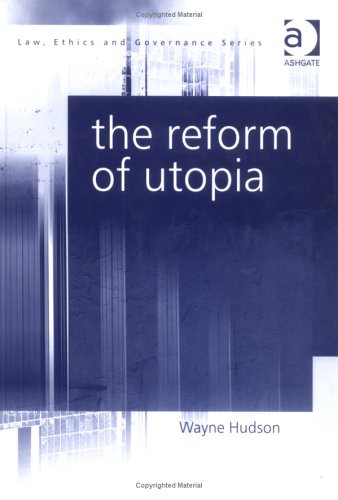Law, Ethics and Governance
1 total work
Arguing that there is a pronounced loss of social direction in Western countries, manifested by a lack of coherent political and social ideals, a fatalist passivity and acceptance of social fragmentation, the author of this text asserts that social reform can be renewed by a reform of Utopia which challenges neo-liberalism without attempting to revive the authoritarianism of the Old Left. This reform of Utopia rejects any unified account of Utopia and breaks with the perfectionism and futurism of modern Utopian thought. On the other hand, it insists that the management of forms of social idealism is important because social idealism can play a crucial part in envisaging alternative arrangements, in mobilizing groups and institutions to act, and in planning how ethical objectives will be concretely realized. To this extent, a "decentred Utopianism", which has no single unified and totalizing ethical vision, can play an important contemporary role, especially if it is focused on concrete micro-reforms rather than fantasies of revolution. This decentred Utopianism can challenge neo-liberalism and offer more than the managerialism of some versions of the Third Way.
A decentred Utopianism does not suggest that Utopianism is the answer to manifold problems. Likewise, it takes for granted that different Utopias conflict and do not tend to a future unity. In contrast to modern European Utopianism, a decentred Utopianism seeks to show how Utopian perspectives and practices can contribute to social, cultural and political reform without promoting totalizing mentalities. Hence, it takes a middle path between those who demand that all social phenomena be judged by principles (and usually the same principles), and those (the so-called postmodernists) who promote social arrangements "without principles" (Marquard 1990 and 1991, Frazer 1989). It does not propose a totalizing form of "critique". Instead, it appeals to a minimal philosophical anthropology to justify judgements about whether specific arrangements promote human flourishing.
A decentred Utopianism does not suggest that Utopianism is the answer to manifold problems. Likewise, it takes for granted that different Utopias conflict and do not tend to a future unity. In contrast to modern European Utopianism, a decentred Utopianism seeks to show how Utopian perspectives and practices can contribute to social, cultural and political reform without promoting totalizing mentalities. Hence, it takes a middle path between those who demand that all social phenomena be judged by principles (and usually the same principles), and those (the so-called postmodernists) who promote social arrangements "without principles" (Marquard 1990 and 1991, Frazer 1989). It does not propose a totalizing form of "critique". Instead, it appeals to a minimal philosophical anthropology to justify judgements about whether specific arrangements promote human flourishing.
